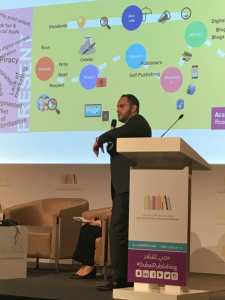What is the Breakthrough Moment for Arabic Digital Publishing?
Emirates LitFest is over, but ArabLit will continue to run excerpts, interviews, and arguments from the 2017 fest:
By Sawad Hussain

During this year’s Emirates LitFest, the inaugural Dubai International Publishing Conference was held over two days, and it included a diverse array of panel sessions from how to manage bestsellers to innovative publishing for the visually impaired. Two publishers spoke at the session “Going Digital: Ebooks and Audiobooks in Arabic.”
Panel members were Shadi Al Hassan and Tarek El Bolbol, and the session was moderated by Ranya Abdel Rahman from the Emirates Literature Foundation. Shadi is a stalwart of the Arabic digital world, founder of what was probably the first Arabic e-book platform, Rufoof (2010), which last year merged with the Swedish audiobook company Storytel. Tarek El Bolbol is a UAE-based entrepreneur on the verge of launching “Book Lava” out of Dubai. His company’s mission is to provide people who have busy lifestyles with the opportunity to listen to top-quality bestselling Arabic audiobooks on their mobile phones. The following are excerpts from the session.
Where is digital publishing at in the Middle East?
Tariq began by asserting that a book isn’t meant to simply stay in its print version. A book is a collection of words that should be in all types and any type of media. He expanded by saying we have become hybrid content consumers who consume a wide range of media. With regards to digital publishing itself, Tariq said it’s an innovation of yesteryear, but the region has a lot of catching up to do: “The full potential in the Middle East has not been harnessed.” He focused on how today there is a generation today that will only consume content from their mobile phones or an app on another device.
“We need to move much faster in order to meet this demand.”
Who is at the forefront of this market?
When asked about the market leader in the field of Arabic digital publishing, Shadi said that, in contrast to established leaders such as Apple for computers and Amazon for books, there is no front runner in this Arabic market at the moment. “At Rufoof we are now trying to fill this gap. We first started with the e-book but struggled with return on investment. Whatever we do needs to be localized for our market and their circumstances. So for example when we started off, we thought of copying the international practice of selling books over digital apps on tablets or mobile phones. It didn’t work. Why? Because in our culture we have an issue of buying content digitally. We don’t really believe in submitting our credit card details online. We may do it for goods, things that are tangible. But for digital content, unfortunately until today many take it for granted that it should be free.” When Shadi and his team realized this, they changed their business model. They looked at working with government sponsors in order to make this content free in the end for users.
How do you choose your content?

Tariq said that, when deciding which content to make available through Book Lava, one problem was was the lack of Arabic bestseller lists. “This is an issue that needs to be resolved so that all platforms can see what is working in Saudi, Egypt, in the Levant, UAE etc. Additionally, from our experience of talking to authors and publishing houses, authors have been more open to having their books converted into audio format. Publishing houses on the other hand have been more reluctant because they see audio books as competing with their print versions.”
He said that market research has proven this is false with some consumers, who buy the audio book after having read the print book, or vice versa. Unfortunately his experience has been that few have understood the value in investing in having their content available on audiobook platforms. Tariq strongly believes that digital publishing complements traditional publishing.
Where are the readers?
Tariq ended with the point that in the last one hundred years the Arab world has seen a lot of turmoil. This has resulted in at least fifty million individuals of Arab origin scattered around the world, concentrated in pockets in some areas and more widely dispersed in others. He sees the need for digital publishing much greater in this Arab diaspora community and in the Arab world itself when compared to English digital publishing due to complications with distribution of Arabic books. “As Arabs we represent 4-5% of the world population but the digital penetration of Arabic content online is only 1%. So we are under-consuming by 4-5 times. What is also surprising is that we expected the Gulf to be the greatest consumers of digital content as they have the strongest purchasing power. However we have found that Arabs living abroad are the most excited and invested in this digital content as they are unable to buy the books they want outside of the Middle East.”
* * *
Though there are a number of challenges that Arabic digital platforms still need to figure out, such as how to make it cheaper to digitize the Arabic content in the first place, there are several platforms moving ahead, including Kotobi, Kitab Sawti, Google Play, and others.
Sawad Hussain is a Cambridge-based editor-at-large for ArabLit who is also an Arabic translator and litterateur who holds a MA in Modern Arabic Literature from the School of Oriental and African Studies. She is passionate about all things related to Arab culture, history and literature.

March 18, 2017 @ 1:30 pm
Very informative article about digital publishing, most enlightening, thanks sawad
March 21, 2017 @ 2:56 am
great Article, well done Sawad